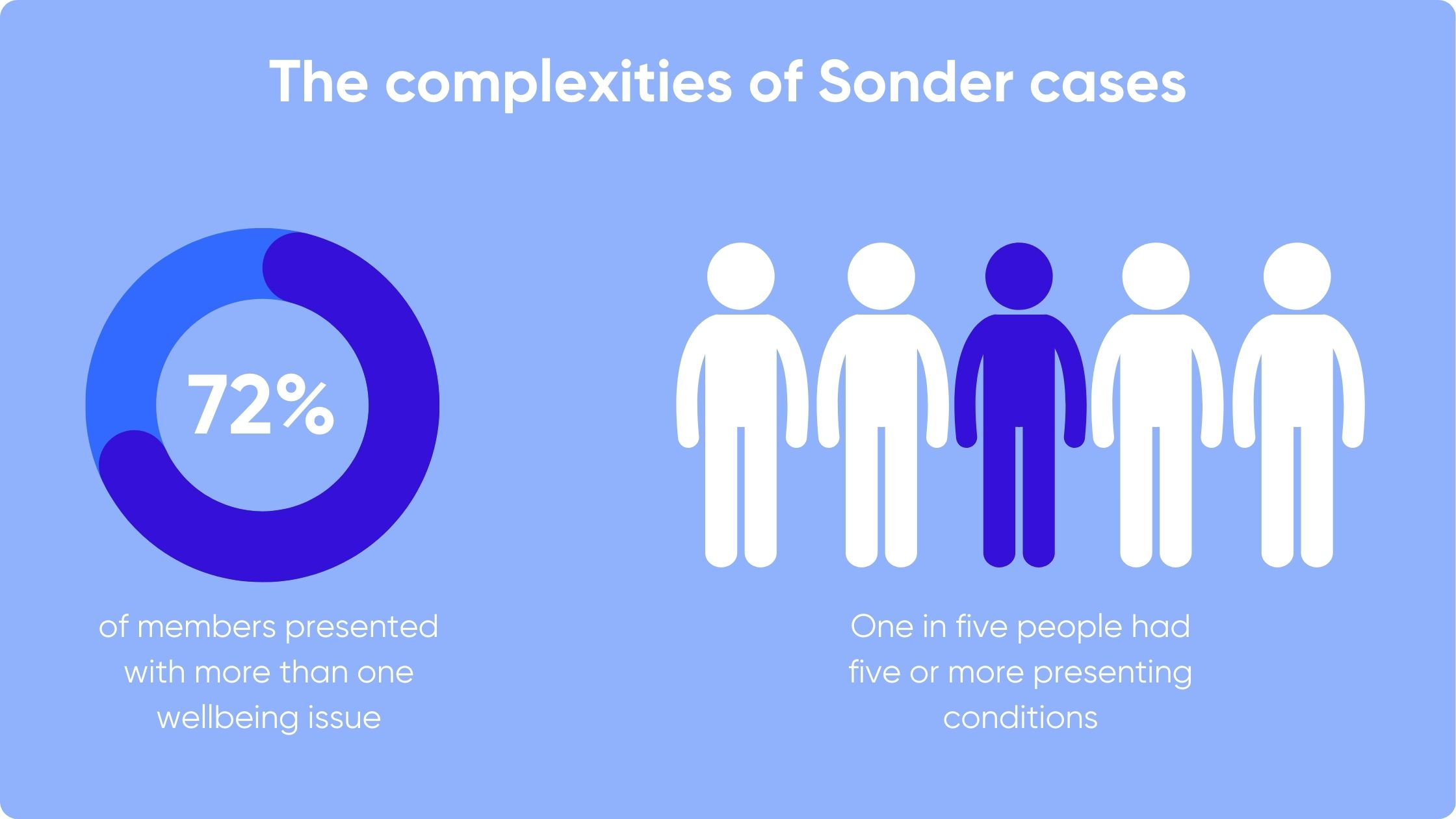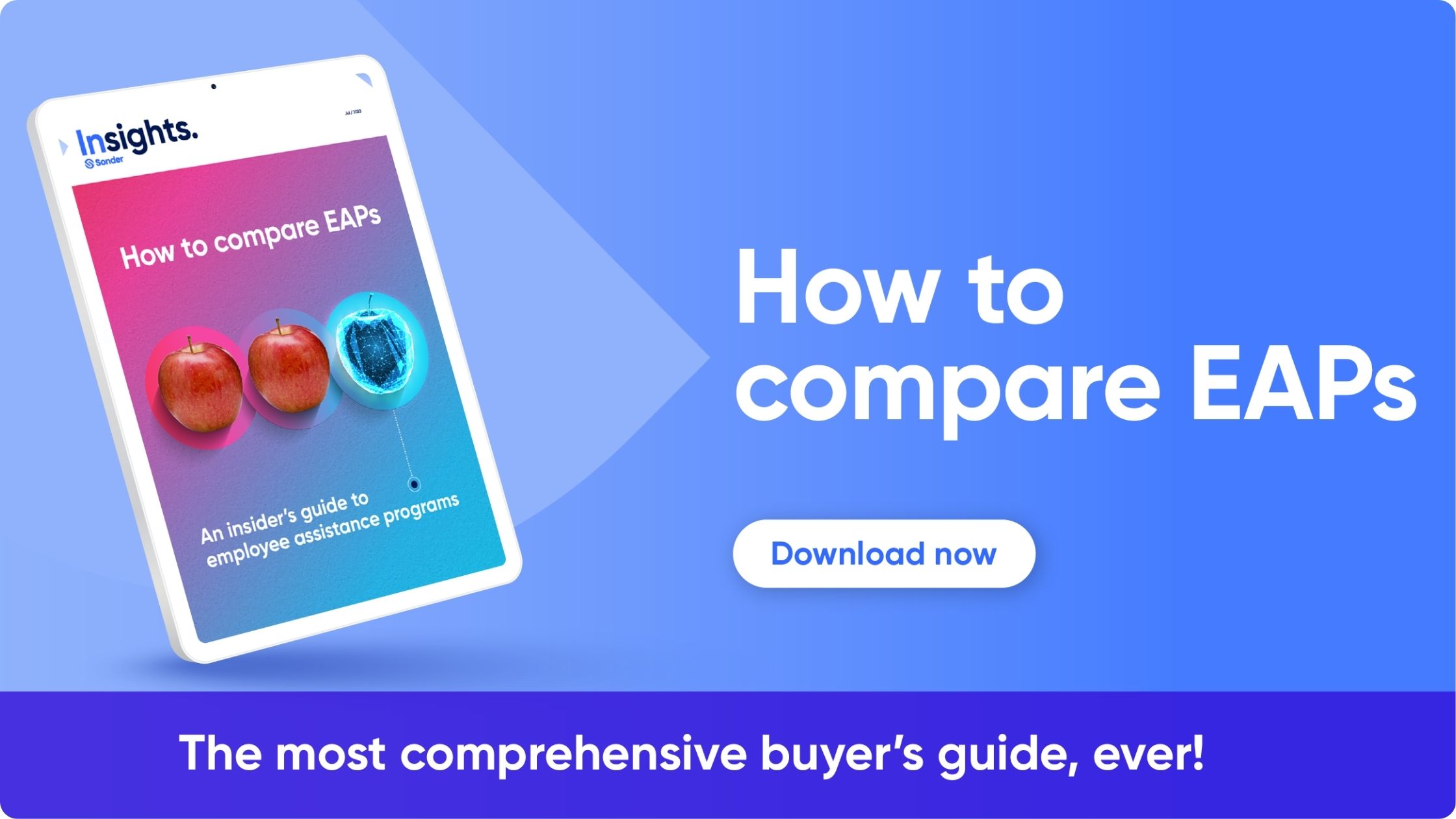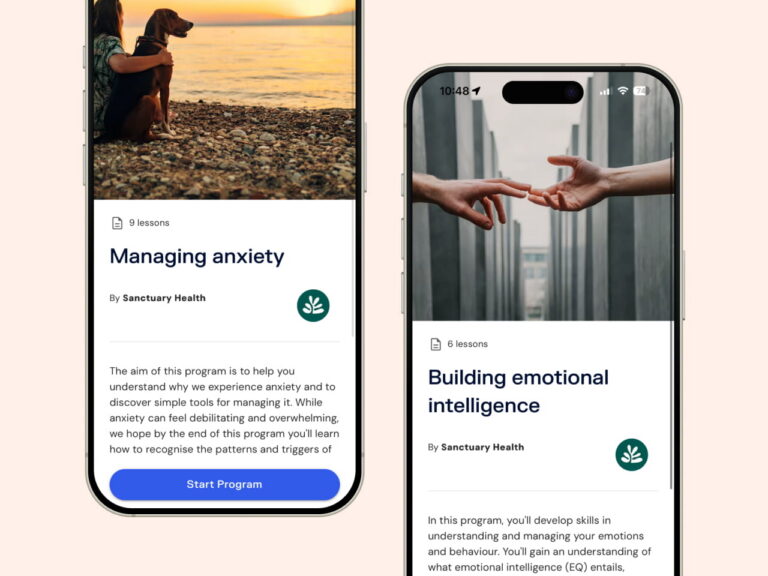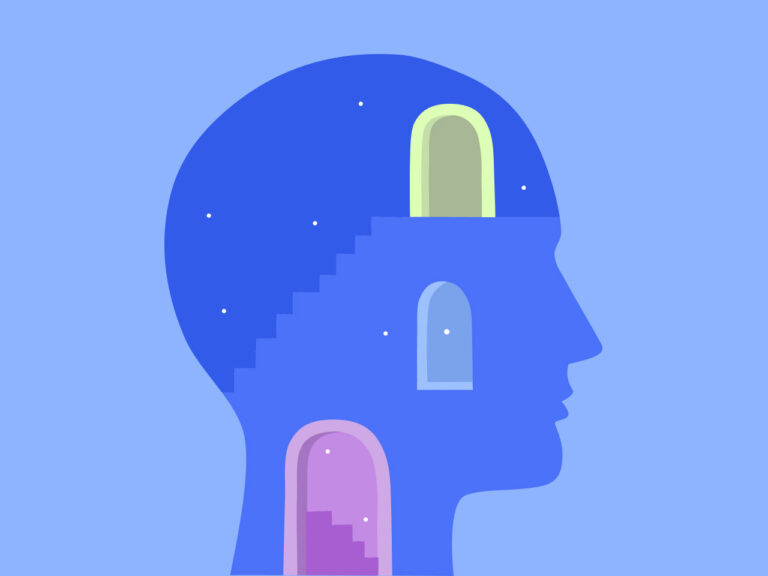The TL;DR:
- A traditional EAP is a work-based program designed to assist employees with personal and work-related challenges via basic mental health support
- Traditional EAPs are well-intentioned but can experience low utilisation rates.
- To allow their people to perform at their best, many employers are now looking to provide ongoing, preventative care, and medical and safety benefits.
Traditional Employee Assistance programs (EAPs) are designed to help employees navigate personal problems that may negatively impact their job performance. These services are often integrated into an organisation’s human resource strategy, acting as a referral system for employees in need. Whether it’s substance abuse, family issues, or any other personal problems, EAPs offer services to help employees resolve issues.
Sonder is an EAP alternative challenging the traditional EAP model. Sonder’s employee care platform provides businesses the next step in employee assistance and gives workforces easy access to medical advice, safety support and mental health care all in one place. It also has a network of responders who can quickly assess and assist in complex and varied scenarios that include workplace aggression, with support centres that are staffed 24/7.
In this article, we’ll explain the fundamentals of traditional EAPs.
Understanding the core of confidential EAP services
At its heart, a traditional EAP is a work-based program designed to assist employees with personal and work-related challenges. These could include stress, relationship troubles, or substance abuse. The primary aim is to ensure employee wellbeing and maintain optimal job performance.
For instance, if an employee faces a stressor that affects their work, they can be referred to a counsellor through the traditional EAP program. This assistance can prevent longer-term issues, such as absenteeism and presenteeism, ensuring that employees are at their best both personally and professionally.
Given that comprehensive wellbeing support has been shown to make employers happier and perform better in their roles, businesses are now looking to provide the support people need so they can get well, stay well, and perform their best at work. While EAPs have long been synonymous with mental health counselling services, today’s employees expect more than just mental health support. To perform at their best, many employees are also looking to their employers to provide ongoing, preventative care, and medical and safety benefits. Which is where complete care platforms like Sonder come in.

A brief history of EAPs
The first EAPs surfaced in the latter half of the 19th century when some employers began to focus on employee wellbeing as a way to stabilise the labour force and inspire goodwill. They gained mainstream momentum in the late 1930s/early 1940s when drinking on the job was the norm and people began to notice the negative effects of occupational alcoholism on job performance and productivity.
Financial aspects of EAPs: ROI and burnout prevention
Historically, when evaluating employee wellbeing programs, business leaders have focused on return on investment (ROI) and people leaders have focused on the impact on their people.
While there’s an upfront cost, often calculated as $30-$50 per employee, according to the 2020 Workplace Outcome Suite, for every dollar invested in traditional EAPs, there’s an average ROI of 3:1, primarily due to reduced sick leave, improved productivity, and decreased turnover.
Often a barrier to higher ROI is a lack of employee uptake. Traditional EAPs are well-intentioned but experience a utilisation rate as low as 5%.
Reasons for this include:
- The service is not built into the culture. Teams don’t know about, or trust, the service. Or the very act of reaching out for help is stigmatised.
- Solutions are not the right fit. Teams in need of safety or medical support are only being offered counselling, for example.
- Poor past experiences. Employees remember a time in which they reached out to an EAP and received inadequate support, so their trust in the service as a whole is impacted.
ROI: Beyond the numbers
While the tangible financial return on investment of EAPs and their alternatives is evident, the broader benefits they bring to an organisation are equally, if not more, significant. A workforce that feels supported and understood is more engaged, loyal, and motivated. By addressing personal problems that may impact work, a more positive workplace culture can be formed.
This enhanced morale can lead to increased creativity, collaboration, and overall productivity. The indirect savings from reduced turnover, fewer recruitment costs, and a decrease in workplace conflicts further amplify the ROI. In essence, the true value of EAPs and their alternatives isn’t just in the numbers but in the holistic improvement of the workplace environment.
Today, as business leaders have become more attuned to the flow-on business benefits of a healthy workforce, and people leaders have become more data-savvy, the two camps are building alignment around an agreed return on value (ROV) assessment – which considers the program, business, and people impact. This blog post shares more on ROI statistics, plus an overview of ROV assessment measures.
Diverse and confidential services under the Employee Assistance Program umbrella
Traditionally, EAPs only offer mental health services, however some may also offer:
- Legal advice
- Financial counselling
- Health insurance guidance
In a sample of 10,000+ active member cases, Sonder found that more people reached out for medical support than for either mental health counselling or safety support. Almost 72% of members presented with more than one wellbeing issue, and nearly one in five people had five or more presenting conditions.
This meant that most people who reached out for support were contending with multiple, intertwined challenges, with the impact compounded for each challenge. This illustrates that wellbeing is unique and complex, and cannot usually be solved with mental health counselling alone.

The future of EAPs: Addressing burnout and promoting wellness
With the increasing recognition of mental health, the need for alternatives to traditional EAPs, like Sonder, is growing. A one-size-fits-all referral to an employer-funded psychologist isn’t always appropriate and isn’t always enough. The benefit of combining mental health support with medical and safety support allows an upfront triage by a support staff, to avoid conditions being overlooked (or treated in the wrong order).
Many benefits come with integrating an EAP alternative in your company, such as:
- Adds value to employees’ lives
- Ensures organisational productivity
- Enhances resilience in the face of challenges
Choosing the right EAP provider for your workplace
Selecting the right provider or alternative is crucial. Companies may base their choice on:
- Their number of employees
- The range of services offered
- A provider’s expertise
It’s essential to ensure that the solution, whether a traditional EAP or an alternative like Sonder, aligns with the company’s values and needs. For instance, if a company has a significant number of employees facing financial challenges, the EAP should have a strong financial counselling component. If your employees work late shifts, or often travel alone, a safety component could be an important consideration.
For an effective EAP program, it is also important to consider whether services are available when employees need them most. Some EAP services are open 9am-5pm. Others stay open until 9pm but for crisis-only assistance or only for appointment setting. Some modern EAP alternatives, like Sonder, are open 24 hours, 7 days a week.
Data from our sample cohort of 10,000+ active member support cases (across various industries) showed 57% of people reached out for support after business hours. That means that if Sonder hadn’t been open 24/7, most people would not have accessed the care they needed when they needed it.
“It’s so important to ensure that your people are able to seek help whenever it makes sense for them. Accessibility is becoming increasingly crucial because many individuals are working varying hours across many diverse job roles. We don’t know when we need support. It’s so important to ensure that your people are able to seek help whenever it makes sense for them.”
Leanne Naber
Senior Account Executive, Sonder
Why considering an alternative to traditional EAPs is essential
In today’s rapidly changing work environment, the needs and challenges faced by employees are evolving. Traditional EAPs, while beneficial, might not fully address the diverse and complex issues that modern employees encounter. Here’s why considering an alternative to traditional EAPs is becoming increasingly essential:
- Holistic Wellbeing Approach: Alternatives to EAPs often adopt a more holistic approach to employee wellbeing, addressing not just mental health but also physical health, safety concerns, and other aspects of an individual’s wellbeing.
- Adaptability: EAP alternatives are often more adaptable to the unique needs of different organisations and their employees. They can be tailored to address specific challenges, whether it’s the stress of remote work, the complexities of a global workforce, or the nuances of specific industries.
- Technological Integration: Modern alternatives to EAPs leverage technology to provide more accessible and immediate support. This can include apps, online platforms, and digital resources that employees can access anytime, anywhere.
- Proactive Support: Instead of just reacting to problems, many EAP alternatives focus on proactive support, offering resources and programs that help prevent issues before they escalate. This can include wellness workshops, regular check-ins, and educational resources.
- Cultural Fit: As companies become more diverse and inclusive, there’s a need for support services that reflect this diversity. EAP alternatives often offer multilingual support, cultural sensitivity training, and resources tailored to a broader range of employee backgrounds.
- Employee Engagement: Traditional EAPs sometimes suffer from low utilisation rates. Alternatives often employ strategies to increase engagement, ensuring that more employees benefit from the available resources.
- Continuous Improvement: EAP alternatives often incorporate feedback mechanisms, regularly updating and improving their offerings based on employee feedback and changing workplace dynamics.
While traditional EAPs have played a crucial role in supporting employee wellbeing, the modern workplace requires a more comprehensive, adaptable, and proactive approach. Alternatives to EAPs, like Sonder, are designed to meet these evolving needs, ensuring that employees receive the support they require in a way that aligns with today’s work environment.

91% of employees said it’s important their next employer offers mental wellbeing support.
84% of employees believe it’s important for employers to offer personal safety benefits.
39% of employees who had access to gym/ fitness services would prefer to have access to doctors and nurses.
The link between EAPs and reduced burnout
Burnout has become a big concern in recent years, especially with the rise of remote work and the blurred lines between professional and personal lives. Here are the classic symptoms of burnout:
- Feeling constantly drained
- Feeling disengaged
- Feeling disillusioned
EAPs and their alternatives play a pivotal role in addressing the root causes of burnout. By providing counselling services, stress management workshops, and resources on work-life balance, EAPs equip employees with the tools to combat burnout before it takes a toll on their wellbeing and job performance.
Confidentiality: The cornerstone of EAPs
One of the primary reasons employees hesitate to seek help is the fear of their issues becoming public knowledge within the workplace. Both EAPs and alternatives prioritise confidentiality, ensuring that employees’ interactions with counsellors or any service provider remain private. This confidentiality fosters trust, encouraging more employees to utilise the program and seek assistance when they need it most.
The way forward with EAPs and their alternatives
Want to learn more? Dive deeper into the world of EAP alternatives and discover how they can transform your organisation with our ultimate EAP buyer’s guide.
- Learn how to compare vendor offerings
- Discover what makes EAP alternatives different
- Gain insider tips and statistics
- Write a convincing business case

Discover a modern approach to employee wellbeing with Sonder
EAPs have long been a cornerstone of employee support in many organisations. However, as the workplace evolves and the needs of employees change, so too must the support structures in place. With platforms like Sonder challenging the traditional EAP model with its complete care platform, it’s clear that the future of employee assistance is set to be more holistic, comprehensive, and aligned with the modern needs of the workforce.
Ready to experience the future of employee assistance? Book a demo with Sonder today and witness firsthand how we’re helping organisations empower people to be at their best. Providing support through the right care, at the right time.



